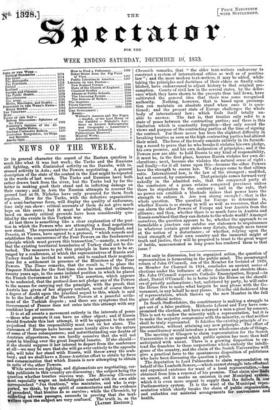Not only in discussion, but in organized action, the question
of representation is fermenting in the public mind. The prearranged return of Sohn O'Connell, son of the Member for Ireland of 1829, as Member for Clonmel in 1854, concludes an ancient series of elections under the influence of effete factions and obsolete ideas. Mr. John O'Connell represents Catholic Emancipation, Repeal—in short, Daniel O'Connell : he is borne into the House on the should- ers of priestly acclamations ; but, unfettered by party, he will enter the House free to make what bargain he may please with the Go- vernment, in any behalf he may please. It is the old-fashioned idea of representation, which throws up the new Member in the full. glare of official notice.
In South Staffordshire, the constituency is making a struggle to get out of a false position. Hitherto Liberal and Tory have com- promised the election, and have returned a man a-piece by consent This is not to endow the minority with a representation, but it is to make the majority compromise with the minority, so that neither shall be truly represented. It falsifies the existing principle of re- presentation, without attaining any new principle. The effort of the constituency would introduce a more wholesome state of things. The meeting at Glasgow to claim representation for the Scotch Universities is an appeal which public opinion has more than half anticipated with assent. There is a growing disposition to ex- tend the franchise to those corporations which embody the intelli- gence of the country, and the claim of the Scotch Universities will give a practical force to the spontaneous disposition of politicians who have been discussing the question a priori.
The deputation to Lord Palmerston to claim representation on behalf of the Lambeth Sewers,—which cannot struggle into effectual and organized existence for want of a local representation,—has obtained from him a renewal of his promise. That claim ulso i$asds an assent, and it marks an omission in our Munioir,1 Britem, which it is even more urgent to supply than the defeats M our Parliamentary system. It is the want of the Municipal repre- sentation which chiefly breaks the chain of public organization, and enfeebles our material arrangements for convenience and health.


































